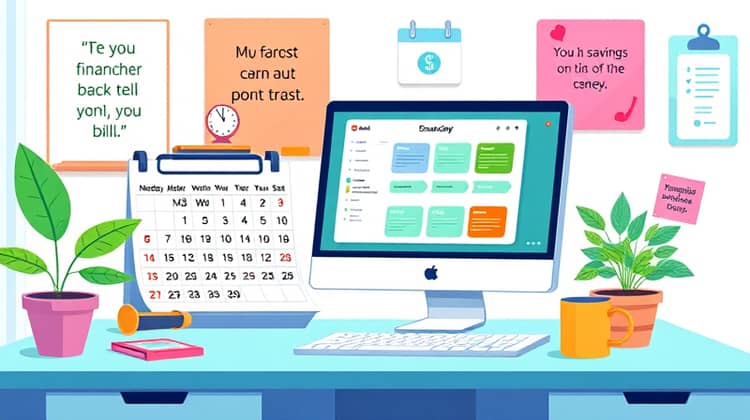Streamline Your Finances: 7 Easy Tips for Simplification

Managing personal finances can sometimes feel overwhelming, but it doesn't have to be. By streamlining your financial processes, you can save time, reduce stress, and potentially increase your savings. In this article, we will discuss seven easy tips that can help simplify your finances, making them easier to manage and understand.
The goal of these tips is to provide practical solutions that you can implement immediately. Simplifying your finances doesn't require a complete overhaul of your system; rather, it is about making small adjustments that can lead to bigger improvements over time. Let’s dive into these effective strategies to help you regain control over your financial life.
By adopting these simple practices, you'll be on your way to managing your money more effectively, allowing you to focus on what truly matters. Let's explore these tips in more detail.
1. Consolidate Your Accounts

One of the first steps to simplifying your finances is to consolidate your accounts. Many people have multiple bank accounts, credit cards, and investment accounts, which can be challenging to manage. By reducing the number of accounts, you can have a clearer overview of your financial situation.
Consider combining your savings and checking accounts into one bank. This not only makes it easier to track your finances but can also save you on account fees. Simplifying your account structure is a powerful way to gain clarity and efficiency in your financial management.
- Close unnecessary bank accounts
- Transfer funds from savings accounts to a primary checking account
- Utilize one or two credit cards to minimize debt tracking
Once you have consolidated your accounts, you will be amazed at the clarity this provides. Keeping track of one or two accounts is far better than juggling several, making it easier to understand your cash flow and expenses. The next logical move in your simplification journey is to automate your savings and bill payments.
2. Automate Your Savings and Bills

Another effective strategy for simplifying your finances is to automate your savings and bill payments. Automation eliminates the need for you to remember to pay bills on time or transfer savings manually each month. This not only saves time but also helps in avoiding late fees and missed payments.
By automating your finances, you create a system that works for you, ensuring that savings are prioritized and that bills are paid promptly, maintaining your credit score and reducing financial stress.
- Set up automatic transfers to your savings account
- Enroll in automatic bill pay through your bank
- Schedule reminders for manual payments if necessary
Incorporating these automated systems into your financial management will drastically decrease the clutter of financial tasks you need to handle actively. With more time on your hands, you can focus on building your savings and investments more effectively. Next, we’ll discuss the importance of using a single credit card for rewards.
3. Use a Single Credit Card for Rewards

Using multiple credit cards can complicate your financial life while also making it challenging to track rewards and manage payments effectively. Instead, consider consolidating your spending onto a single credit card that offers the best rewards tailored to your lifestyle, whether that’s travel points, cash back, or other benefits.
This approach not only simplifies tracking your spending but also enhances your potential to earn rewards. You can focus on maximizing your benefits without the confusion of multiple cards and expiration dates.
- Choose a card with no annual fee
- Look for rewards that match your spending habits
- Avoid using the card for unnecessary purchases
By leveraging a single credit card, you not only streamline your expenses but can also build credit more efficiently. This system presents a clear path to rewards accumulation without the hassle of juggling various payments. Let’s move on to decluttering your financial documents.
4. Declutter Your Financial Documents

Just as it is important to streamline your financial accounts, it is equally vital to declutter your financial documents. A stack of bills, bank statements, and tax records can be overwhelming and lead to crucial documents being lost among the chaos. You will want to create a streamlined system for handling your paperwork.
Begin by sorting through your documents and eliminating anything unnecessary. Shred sensitive paperwork that you no longer need, and consider going digital to store essential files for easy access.
- Shred old bills and statements
- Create a digital filing system
- Use cloud storage for easy access
A clean and organized document system not only simplifies your finances but also ensures that you have all necessary records at your fingertips when you need them. The following step is to simplify your investment strategy to enhance your financial management.
5. Simplify Your Investments

Investing can appear complex, but keeping your investment strategy straightforward is essential for effective financial management. If you have numerous investments spread across various platforms and asset types, it may be time to streamline your portfolio.
Consider focusing on a few key investments or funds that align with your financial goals and risk tolerance. Avoid the temptation to invest in every trendy stock or financial product out there.
- Invest in index funds or ETFs for diverse exposure
- Limit individual stocks to a manageable number
- Consider automated investment platforms for simplicity
By simplifying your investments, you not only alleviate stress but also make it easier to track your overall performance. This will allow you to make strategic decisions and adapt as necessary, leading to more successful financial management overall. Next, we’ll discuss creating a basic budget.
6. Create a Basic Budget

Budgeting is a foundational aspect of financial management, yet many people find it intimidating. Creating a basic budget doesn’t have to be complicated or cumbersome. The goal is to have a clear understanding of your income and expenses to better manage your finances.
Begin by listing your sources of income and your mandatory expenses, such as rent, mortgage, utilities, and groceries. This baseline will help you identify areas where you can cut back and save more effectively.
- Track all income sources
- List mandatory expenses
- Allocate funds for discretionary spending
A basic budget empowers you to understand where your money goes each month, making it easier to identify opportunities for saving and investment. Our final point emphasizes the necessity of reviewing and adjusting regularly.
7. Review and Adjust Regularly

Creating a simplified finance system doesn’t end once you implement your strategies; it’s essential to review and adjust your financial practices regularly. Life circumstances change, and your financial situation may evolve accordingly. Therefore, routinely assessing your financial health is paramount.
Schedule a monthly review of your budgets, savings goals, and investment performance. This will keep you on track and allow you to make necessary adjustments that reflect your current financial status.
- Assess your income and expenses monthly
- Review your savings progress
- Adjust your budget according to life changes
Regular reviews create a proactive approach, allowing you to stay on top of your finances and prevent any issues before they arise. This enables greater flexibility and adaptability in your financial life. Now, let’s recap our tips in the conclusion.
Conclusion

Streamlining your finances may seem overwhelming at first, but by implementing these seven easy tips, you can simplify your financial life effectively. Consolidating accounts, automating payments, and decluttering your financial documents are just a few ways to reduce complexity and increase clarity.
Moreover, using a single credit card for rewards and simplifying your investment approach can lead to increased financial efficiency. Creating and reviewing a basic budget regularly will provide you with a solid foundation for managing your finances. It's important to remember that ongoing adjustments and reviews are key to maintaining financial health.
The journey toward streamlined finances isn't a one-time task but a continuing process that enhances your overall financial well-being. Consistency and adaptability in your financial practices will lead to a more manageable and rewarding experience.






